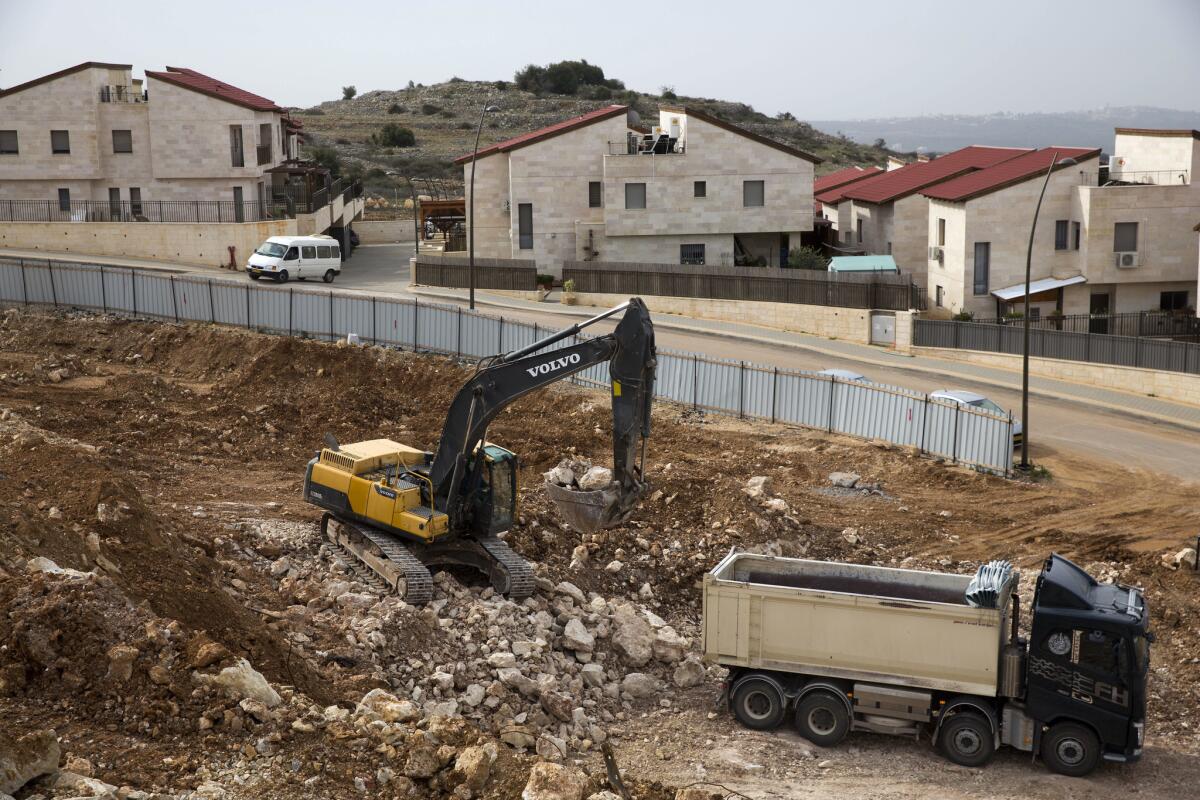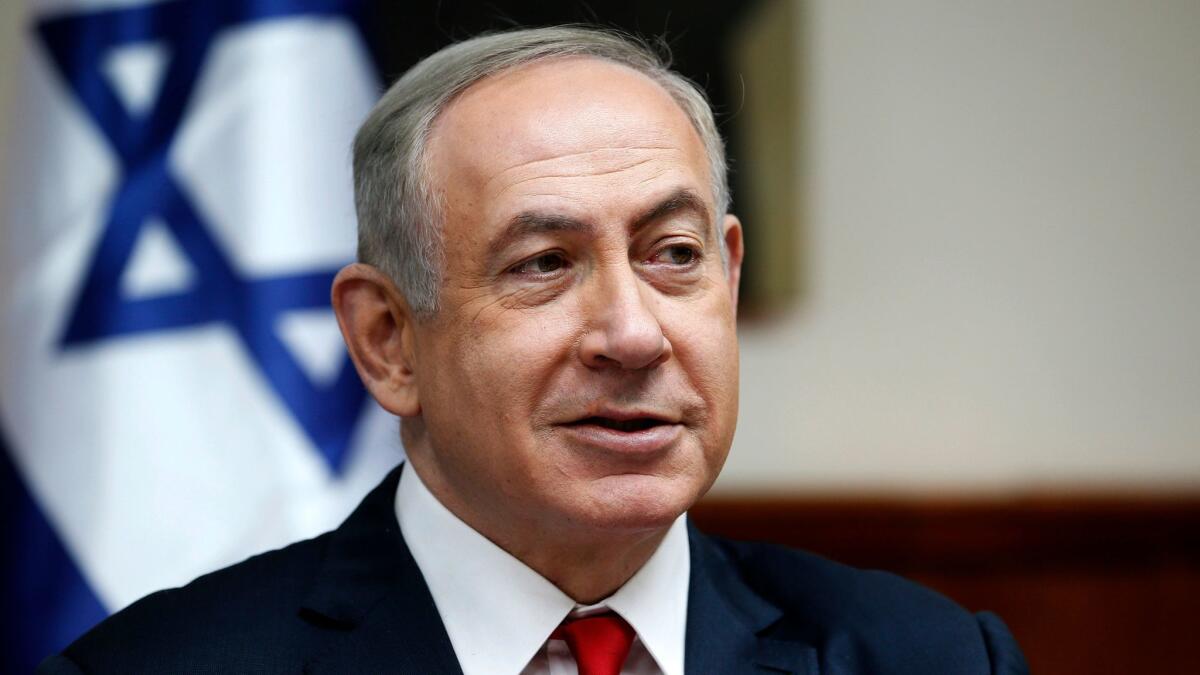Controversial legislation in Israel reflects shift away from two-state peace deal

Israel’s parliament approved a controversial bill late Monday giving the government authority to retroactively legalize thousands of homes in West Bank settlements and dozens of unauthorized hilltop outposts that sit on privately owned Palestinian land.
The legislation was meant as a bow to the country’s influential settlement movement, one of the main constituencies behind Israel’s right-wing government, after Prime Minister Benjamin Netanyahu oversaw the evacuation of hundreds of Israelis from Amona, an unauthorized hilltop outpost, following orders from the Supreme Court.
In addition to avoiding future court-ordered outpost evacuations and home demolitions, passage of the law reflects the Israeli government’s shift away from a longstanding embrace of a two-state peace deal with the Palestinians in favor of retaining control over the entire West Bank.

The vote on the legalization bill, which passed 60-52, comes days before a Feb. 15 meeting between Netanyahu and President Trump at the White House. The two are expected to discuss formulating a joint policy on peace between Israel and the Palestinians, which necessarily includes discussion of the West Bank settlements.
Trump was expected to be substantially more lenient than President Obama about Israel’s settlement building. But on Thursday, the White House released a statement that essentially upheld the Obama position, saying that building new settlements and expanding existing ones beyond their current borders is liable to undercut peace efforts.
Politicians in Israel’s coalition government have been emboldened by Trump’s victory, and by the nomination of a strongly pro-settlement U.S. ambassador. Some Netanyahu allies have been pressing to formally annex parts of the West Bank, while the prime minister has avoided reiterating support for a Palestinian state.
“All of the land of Israel belongs to the Jewish people … these rights are eternal and can’t be challenged,’’ said Ofir Akunis, a legislator from Netanyahu’s Likud Party during the parliamentary debate before the vote. “We are voting on our rights to the land, on the link to the Jewish people to it.”
Palestinian officials said the legalization law marks a break by Israel with two decades of peace negotiations that were premised on the creation of an independent Palestinian state in the West Bank and the Gaza Strip. They warned that the measure would threaten the peace process.
A statement by the Palestine Liberation Organization’s negotiations department called the legislation a “land theft law.’’
“This is the official stamp of approval for Israel’s final rejection of the vision of the two-state solution,’’ said Husam Zomlot, a senior advisor to Palestinian Authority President Mahmoud Abbas. “All settlement activities are illegal, but this bill goes all the way to legalizing the seizing of Palestinian private property.… It would force us to reconsider our commitments under the peace process. This is a new ball game.’’
The law has faced a hail of criticism from Israeli politicians and legal experts, including the attorney general, who warn that it violates Palestinian property rights and marks an unprecedented step toward formal annexation of the West Bank, which has been under Israeli military occupation since the 1967 Six-Day War. Such an annexation, they warn, could expose Israeli military and political leaders to charges of war crimes in the International Criminal Court in The Hague.
“Stop this train before departs. The final station will be at The Hague. Indictments against soldiers, commanders and leaders will emerge from its passenger cars,” said Isaac Herzog, chairman of the parliamentary opposition before the vote. “The parliament is legislating a danger for the state of Israel. It’s legislating de facto annexation, contrary to all of Israel’s international commitments.”
The law allows the government to expropriate private land on which Jewish settlers have erected homes. In return, Israel can offer Palestinians financial compensation. Settlement advocates say it would protect 2,000 Israeli homes in the West Bank from demolition orders.
Peace Now, an Israeli organization opposed to settlement activity, said the law will legalize 4,000 homes, expropriate 2,000 acres of private Palestinian property, and legalize 55 unauthorized hilltop outposts.

A Palestinian shepherd in West Bank city of Hebron, with the Israeli settlement of Givat Harsina in the background surrounded by Palestinian residences, on Feb. 5, 2017.
The Israeli human rights group Yesh Din vowed to fight the law along with Palestinian landowners in Israeli courts.
“The law constitutes a fundamental violation of the right to property; given the Knesset’s lack of authority to legislate upon the West Bank, the landowners’ struggle will continue in court,’’ said a statement from Yesh Din.
Since Israel conquered the West Bank in 1967, Knesset laws had never been applied to lands in the West Bank outside of Jerusalem — until Monday. The territory has been under the legal authority of Israel’s military, which governs based on a mix of Jordanian, Turkish and British rules.
“Once you apply Israeli law on the land, you can’t say that you are not to some extent annexing the territory…. It’s a major change in policy over the last 50 years,” said Yedidia Stern, a law professor at Israel’s Bar-Ilan University. “We are applying Israel law to territory which was conquered by us, and this is forbidden by the international law. This is the first time we apply an Israeli law to territories that are not recognized as part of Israel.’’
Efforts by coalition members to pass the bill in recent years have been blocked by Netanyahu, who rejected it out of fear of negative international fallout. Though the prime minister was not present at the vote because he was on a trip to Britain, his decision to relent reflects rising pressure from rivals in Israel’s political right who support the settlers.
“He is under pressure,’’ said Yoaz Hendel, a former aide to Netanyahu, who said the bill reflects a larger debate in the government about what it should do with the West Bank if it does not become a Palestinian state. “It’s kind of cover for the fact that the right wing in Israel, especially the prime minister, is trying to ask itself what it really wants.”
Mitnick is a special correspondent.
ALSO
Border walls aren’t unheard of, but today they increasingly divide friends, not enemies
More to Read
Start your day right
Sign up for Essential California for news, features and recommendations from the L.A. Times and beyond in your inbox six days a week.
You may occasionally receive promotional content from the Los Angeles Times.






